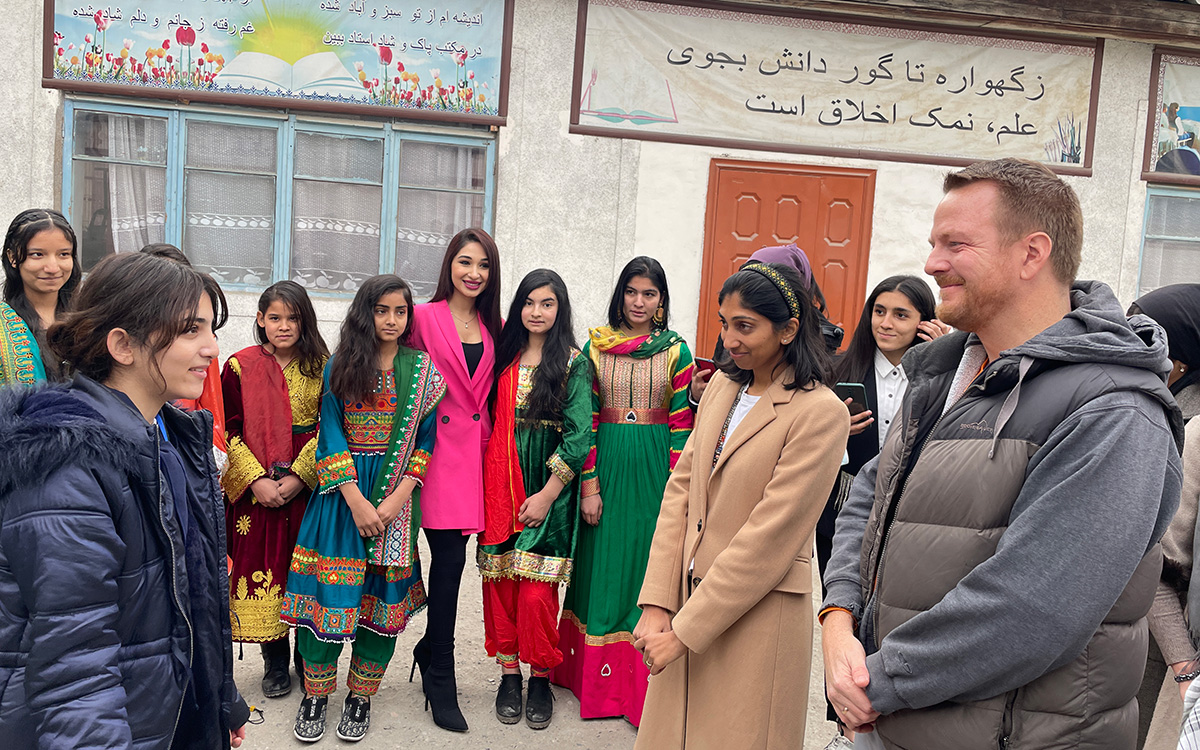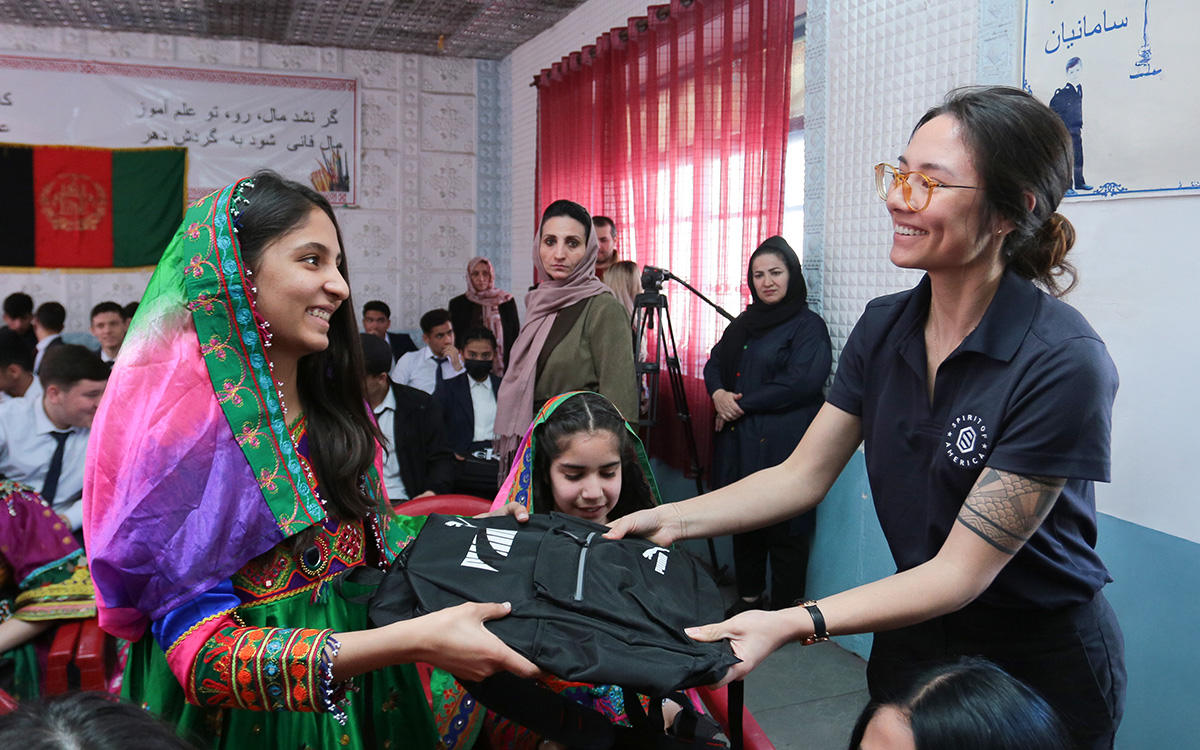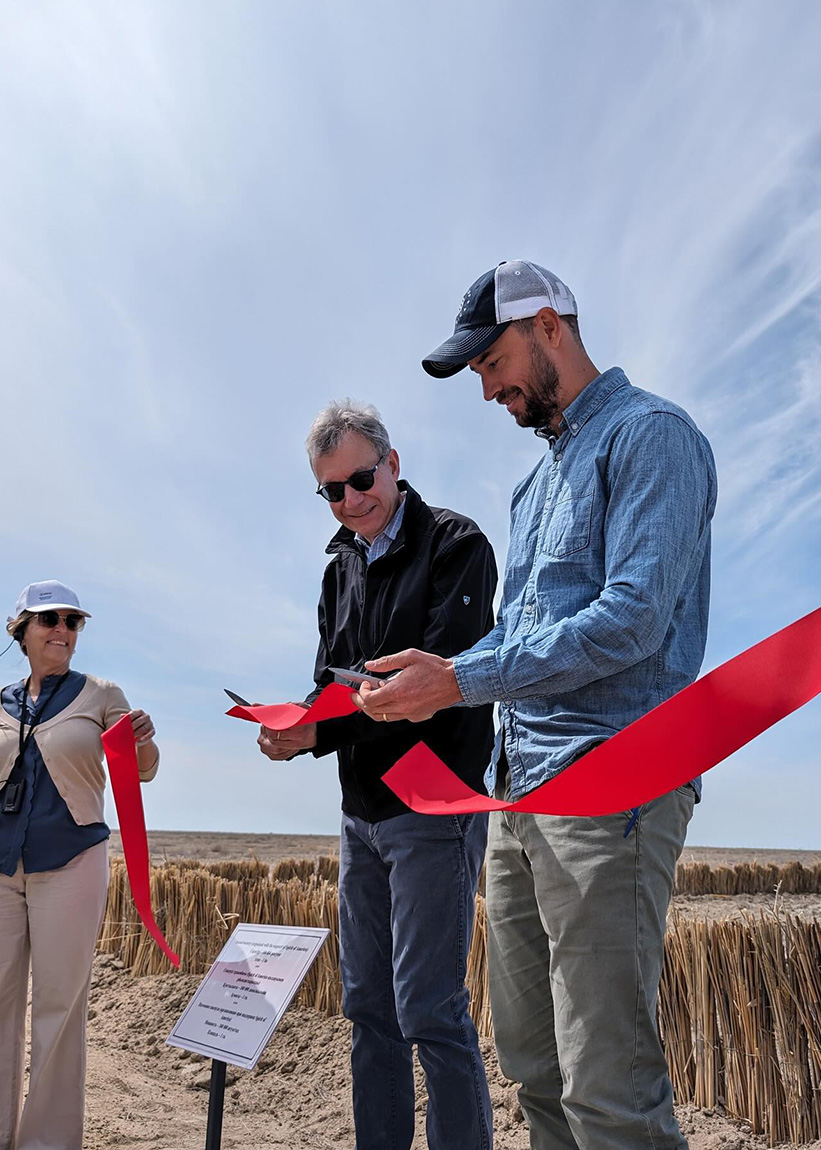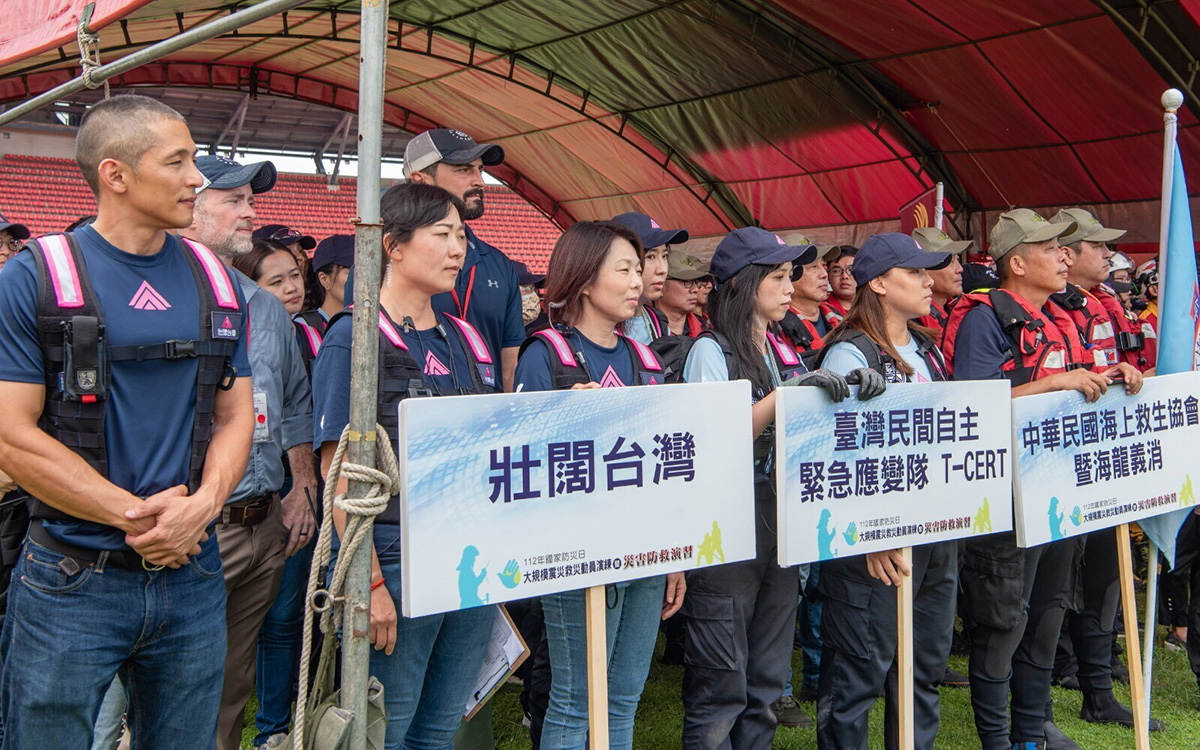Discovering Extended Family at Spirit of America
This former Foreign Service officer found a way to take his development expertise into the nonprofit world.
BY CHAZ MARTIN
When I joined the Foreign Service in 2007, I joined a small family. A speaker told our training class that our family of Foreign Service officers (FSOs) was so small, we were outnumbered by the Department of Defense’s uniformed musicians. To succeed, we would need to depend on each other. Over 11 years of service, I learned how important the Foreign Service family bond can be. It enabled teams I worked with to help save the lives of American citizens in Sudan, defend independent media in Tajikistan, counter extremism in Afghanistan, and build partnerships with dynamic young leaders in Kazakhstan.
I left the Foreign Service in 2018 to join a London-based strategic communications agency and quickly discovered that the private sector had tools and technical capabilities that I never had at an embassy. It was illuminating to gain new skills outside the department, but I missed the sense of mission and family I experienced working with Foreign Service colleagues every day.

Embassy Dushanbe public affairs team member Shefali Agrawal and Chaz Martin at Afghan refugee school in Dushanbe, Tajikistan, December 2021.
Courtesy of Chaz Martin
The Foreign Service has a funny way of pulling you back. Five years after I left the department, my wife joined the Foreign Service and was assigned to Tajikistan, where we had been posted a decade before. This time, I was proud to take my turn as a Foreign Service spouse. As an eligible family member (EFM) working in the public affairs section, I wondered what impact I could make as a now literal member of the Foreign Service family.
I found out on Aug. 15, 2021, when the Afghan government collapsed, triggering a mass exodus from the country. Thousands of Afghan refugees poured into Tajikistan and found safety in the town of Vahdat, where they used a dilapidated building as a makeshift community center and English language school. Tajikistan’s only Dari language school, serving 500 Afghan girls and boys, announced it would shut down within days because it depended on funding from the now-fallen Afghan government. The school needed only $2,500 per month to make rent—a rounding error for most U.S. assistance programs—but for technical reasons, the embassy was unable to identify a funding stream to cover it.
That’s when I discovered Spirit of America, a nonprofit organization that directs private American funding to help U.S. troops and diplomats succeed in their missions—a sort of “extended family” for the Foreign Service.

Spirit of America Assistant Program Manager Maya Sullivan delivering backpacks to Afghan students in Tajikistan, June 2022.
Courtesy of Chaz Martin
Spirit of America’s model is to channel private donations and independent capabilities to meet needs identified by servicemembers and diplomats, thanks to a Memorandum of Understanding with the Department of Defense and inclusion in the National Defense Authorization Act. Because Spirit of America neither seeks nor receives U.S. government funding, it can often operate faster and more flexibly than government-funded partners. In Tajikistan, Spirit of America had been providing support for years, ranging from COVID-19 protective gear to upgrades for the American Space facilities that are used for public diplomacy and other outreach to local community members.
When I told Spirit of America Regional Director Zack Bazzi about the imminent closure of the refugee school and the plight of the Afghan community in the town of Vahdat, he responded within an hour, offering to provide emergency funding to cover the school’s rent for the year. While U.S. government funding might have taken months, Spirit of America sent the school the funds it needed within days, saving it from closure and keeping kids in classrooms. In Vahdat, Spirit of America funded renovations, equipment, and even American Space programming to transform the Afghan community center into a vibrant, welcoming educational hub helping refugee students of all ages. Building on this success, Spirit of America launched the Afghan Future Campaign to create opportunity for thousands of young people across Central Asia and the Middle East.
Spirit of America’s model of agile, innovative support inspired me as a way I could continue supporting the mission of the Foreign Service outside of government. In January 2023, I became an official member of the Spirit of America team, helping embassies and deployed troops accomplish missions that otherwise might not be possible.
My work as Spirit of America’s director of international communications often comes full circle to my time as a Foreign Service officer. Ten years ago, as a public affairs officer in Almaty, Kazakhstan, I led a communications campaign to commemorate the 70th anniversary of the Allied victory in World War II. Today, at Spirit of America, I am helping the U.S. mission to Germany and its local partners in Leipzig mark the 80th anniversary of liberation through an independent digital campaign to educate young people about the role of U.S. troops in securing the freedoms we now enjoy. The lesson is clear: Whether inside or outside of government, we can all play a part in promoting American values and partnership.
 §
§

Spirit of America Regional Program Manager Alex Ebsary (right) and U.S. Ambassador Dan Rosenblum (center) at the Aral Sea greenhouse ribbon-cutting in Kazakhstan, April 2024.
Courtesy of Chaz Martin
At Spirit of America, I have seen my colleagues leverage our model to make transformational changes.
In Europe, our team helps local partners stand up to Russian pressure in ways large and small. When Russia launched its full-scale invasion of Ukraine, our Regional Director Colleen Denny was on the ground within days. Since then, she and her team have delivered more than $59 million in private assistance. Beyond nonlethal support to the Ukrainian military like trucks, buses, and mobile showers, Colleen’s team empowers Ukrainian youth through UActive, a program that works with high school students to develop and implement projects to help their communities recover. Next door in Moldova, U.S. Embassy Chisinau identified a need to help rural communities endure the winter after Russia disrupted energy supplies to pressure the country’s democratic government. Colleen’s team responded by helping Moldovan partners deliver firewood and fuel to keep hundreds of families and schools warm.
Across Asia, our team helps local partners build resilience from the Taiwan Straits to the Gobi Desert. In Taiwan, our Asia-Pacific team is helping civic organizations build their democracy’s resilience to crises. My colleague Josh Brandon and his Asia-Pacific team have helped Taiwanese partners train thousands of people in life-saving crisis preparedness skills. When Embassy Ulaanbaatar highlighted Mongolia’s food insecurity and dependence on Chinese agriculture, Josh’s team partnered with a Fulbright scholar to build a solar-equipped well and greenhouse in the desert, allowing local herders to feed their families and sell to local markets.
In Africa, Spirit of America supports diplomats in critically important places that don’t make the daily headlines, like Comoros, an archipelago in the Indian Ocean that needed help countering maritime trafficking and People’s Republic of China (PRC) fishing encroachment. To help U.S. Embassy Moroni strengthen the Comoros Coast Guard’s surveillance and search and rescue capabilities, Spirit of America’s Africa Regional Director John Schroder launched a pilot program to provide surveillance drones and training. Spirit of America’s early investment in maritime domain awareness was so successful it ultimately led to a much larger U.S. government investment. As terrorism has spiked across the Sahel, so has our Africa team’s collaboration with U.S. embassies in coastal West Africa, where we help local partners build resilience to threats to their communities and democracies.
In the Middle East, Spirit of America works closely with embassies and military personnel to fill critical gaps between what is needed and what the U.S. government can do. In Iraqi Kurdistan, our team is partnering with Consulate General Erbil and the Kurdistan Regional Government to train hundreds of Peshmerga security personnel in English-language skills, expanding their access to U.S. training programs. Beyond military collaboration, our team empowers local partners to create opportunity, like a community-based tourism project to map trails in the Zagros Mountains. Our work in Iraqi Kurdistan has strengthened America’s relationship with an important partner in the Middle East.

Spirit of America helps Taiwanese civic organizations train citizens in emergency response capabilities, and it joined national exercises in 2023 and 2024.
Courtesy of Chaz Martin
I’ve seen the power of strategic private investments—what we like to call “venture capital for national security”—that can help larger U.S.-funded projects make a bigger difference. In Kazakhstan, for example, my colleague Alex Ebsary learned that USAID was helping Central Asian partners restore life in a place the Soviet Union had left for dead: the Aral Sea basin. Through the Oasis project, USAID planned to introduce drought-resistant plants to counter desertification and reduce the spread of toxic dust that threatened public health.
There was a problem, however: The project needed a new greenhouse to grow 100,000 plants every year in the middle of the desert. Spirit of America invested $55,000 in private funding to build the greenhouse, the missing piece that enabled the $10 million-plus Oasis project to make impact at scale. To help tell this story of recovery and partnership, we invited some of Kazakhstan’s most popular social media influencers to visit the Aral Sea. The story resonated: Through Instagram and TikTok, more than 1.1 million viewers across Central Asia learned how partnership between the United States and Central Asia is helping the region heal.
I loved being in the Foreign Service. Today, I have the privilege of being part of its extended family of veterans, philanthropists, entrepreneurs, and like-minded citizens who believe in the ideals of America and stand with people around the world who share our values. By channeling the ingenuity, capabilities, and resources of the American people, Spirit of America has pioneered a “whole of America” approach to public service.
When sharing or linking to FSJ articles online, which we welcome and encourage, please be sure to cite the magazine (The Foreign Service Journal) and the month and year of publication. Please check the permissions page for further details.




